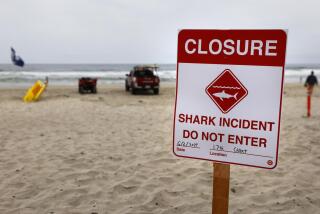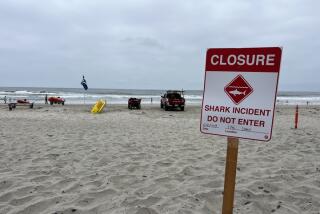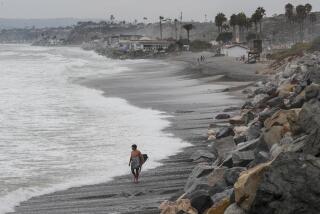Man hospitalized after apparent shark attack off Cape Cod
A man was hospitalized after he was apparently bitten by a shark off Cape Cod, Mass., in an area where there has been a series of recent shark sightings.
The Cape Cod Times identified the man as Christopher Myers and said he had been transferred to a hospital in Boston. His condition was not known. Witnesses said they saw the attack occur as Myers body-surfed with a companion in the waves off Ballston Beach in the town of Truro.
“Suddenly something came up between them. It had a large dorsal fin,” one witness, Anne-Marie Corner, told ABC News. “I saw the shark come out. It went up, came down,” said another, Ann Rayment.
PHOTOS: Sharks and people, too close for comfort
Marine experts are trying to determine whether the injuries were caused by a shark.
Beach-goers dialed 911 after Myers was pulled under water, resurfaced, and then made his way to shore, his legs bleeding below the knees. “It was pretty deep. You could see muscle and bone,” a Truro police officer, Scott Holway, told ABC. “It was like his flesh had been ripped.”
Last month, beachgoers at Nauset Beach in Cape Cod watched in horror as a shark’s dorsal fin trailed behind a kayaker, who paddled quickly to get away. That incident occurred roughly 15 miles from Ballston Beach, which was open to swimmers on Tuesday but with notices posted about the Monday attack.
If the bites do turn out to have been caused by a shark, it would mark a rare attack by a species that scientists say doesn’t often go after humans. Instead, sharks are interested in their main food source, seals, whose numbers have soared since they became off-limits to hunting in 1972.
According to the International Shark Attack File at the University of Florida, there were 75 unprovoked shark attacks on humans in 2011 worldwide. Twenty-six of them occurred in North America.
Speaking specifically about white sharks, the species made famous in the 1975 movie “Jaws” and that most people associate with attacks, marine scientist Charles “Stormy” Mayo told the Los Angeles Times: “These are very big, powerful predators, but as we speak, there are probably dozens of near approaches between humans and white sharks.”
“The reality is that even though I don’t want to be around a white shark, I could probably paddle around one and blow bubbles in the water and the animal would probably do nothing,” said Mayo, senior scientist at the Provincetown Center for Coastal Studies in Provincetown, Mass.
ALSO:
London 2012 Google Doodle: Celebrating men’s rings
Drew Peterson murder trial: Ex-cop accused of killing third wife
Kent State student accused of tweeting plan to ‘shoot up’ campus
More to Read
Sign up for Essential California
The most important California stories and recommendations in your inbox every morning.
You may occasionally receive promotional content from the Los Angeles Times.











